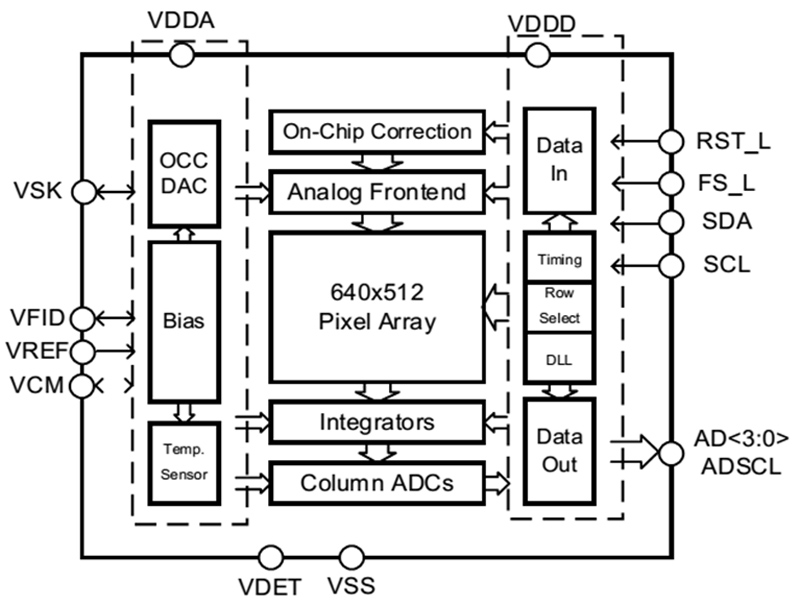640x512 array size
12μm pixel size
Operating wavelength range: 8μm to 14μm
Frame rate: 25~60Hz
NETD < 40mK (F/1, 300K, 50Hz)
Thermal time constant: 8-10ms
Power supply: VSK=4.6V (typical), VDDA=3.6V, VDDD=1.8V
Low power consumption<150mW @50Hz
Fully digital interface, no external DAC/ADC required
Digital interface, 4-port 16-bit digital output with synchronous clock, 4-bit single-port input pixel OCC, external frame synchronization and asynchronous reset,<100MHz input clock @60fps
Supports applications without TEC and shutter
Operating temperature range: -40°C to +65°C
Available in 36PIN PGA, 32PIN PGA, 30PIN PGA, 32PIN PGA dual-row ceramic package
Package dimensions: 24x24x3.9mm, 22x22x3.9mm, 20x20x4.1mm, 22.86x22.86x4.5mm
Observation and targeting
Industrial temperature measurement
Security surveillance
Firefighting and rescue
Automotive night vision
Building inspection
Medical and health
The GH-LWA-612AC uses a digital readout with a built-in 14-bit column-level ADC and outputs data through a 4-port CMOS format. The data format can be configured as binary or Gray code, with a single-port data rate of 78Mbps @50fps. The GH-LWA-612AC also provides a synchronous sampling clock (ADSCL) for data synchronization.
The GH-LWA-612AC adopts a simple power supply and reference input method. The analog power supply is 3.6V, the detector's low-noise power supply VSK is typically 4.6V (adjustable based on noise and gain requirements), and the external low-noise reference input is 2.5V. The digital power supply VDDD is 1.8V (VDDD and VDDIO can be separated, and VDDIO supports 1.8-3.3V).
The GH-LWA-612AC features a new low-power readout architecture, with total power consumption under 130mW at a high frame rate of 50Hz, minimizing the impact of detector heat on performance.
The GH-LWA-612AC supports on-sensor 4-bit per-pixel offset NUC, global offset correction, and temperature drift correction to ensure dynamic range of the readout.
The GH-LWA-612AC allows adjustment of the channel response in multiple dimensions, meeting the wide dynamic range needs of industrial temperature measurement, and supports achieving the best signal-to-noise ratio in high-gain + long integration time mode.

Figure 1. Functional Block Diagram of the GH-LWA-612AC Detector (only essential connection pins labeled)
Definition | Description | Represent active value | Remarks |
Sensor | Uncooled VOx Micro radiation bolometer | ||
Spectral coverage | Long-wave IR, from 8 μ m to 14 μ m | ||
Array size | 640x512 | Excludes peripheral dummy pixel rows (the array size including peripheral dummy pixel rows is 644x516). |
Package | 32-tube pin PGA ceramic package | ||
Pixel size | 12μm | ||
Frame frequency | 25~60Hz | 50Hz | |
ADC bit | 14bit | ||
Thermal sensitivity | Temporal NETD | ≤40mK | @F =1,T =300K,50Hz |
Integration capacitor range | 8 | 4pF | 2pF ~9pF |
Digital output | The 4-port CMOS logic level | Contains the temperature- sensing output | |
Input main clock frequency (fSCL) | 39.1 ~93.8MHz | 80MHz | At 50Hz to work |
Control protocol | SPI | External frame sync | |
Power voltage | 3.6V/1.8V | Digital I/O compatible with 3.3V/1.8V: For 50/60Hz applications, 3.3V is recommended; for 25/30Hz applications, both 3.3V and 1.8V are acceptable | |
Detector power supply VSK | 4.4~4.8V | 4.6 V | |
Power dissipation | 80 ~150mW | 130mW | @T =300K,50Hz |
Package | 36-pin PGA ceramic package | Or 32 pin PGA ceramic package, 30-pin PGA ceramic package | |
Size | 24x24x3.9mm | Or 22x22x3.9mm, 20x20x4.1mm, 22.86x22.86x3.625mm are all acceptable | |
Weight | ≤8g | ||
Operating temperature range | -40 ~65℃ | 27℃ | Without TEC |
Description of the operational rate index
The detector operability is greater than 99.5%, i. e., within the 640 x 512 array region.
(1) No bad line or bad row.
(2) The maximum number of bad cluster size in the central area (160×120) shall not exceed 8 blind pixels.
(3) The maximum number of bad clusters outside the central area does not exceed 14 blind pixels, and the number of clusters with 9 to 14 blind pixels does not exceed
Want to Get More Details About SYTO Image Sensor & IR Camera?